Quebec's ban on religious symbols faces historic legal challenge
The lawsuit, filed by the National Council of Canadian Muslims (NCCM), the Canadian Civil Liberties Association (CCLA) and Ichrak Nourel Hak, a Muslim woman, challenges Bill 21 as unconstitutional.
Under the law, public servants, including some teachers, lawyers and police officers are barred from wearing religious attire like hijabs, kippahs or turbans in the workplace.
Activists and the plaintiffs say Bill 21 is discriminatory and has created "second-class citizenship" for religious minorities in Canada.
The bill has faced widespread criticism, including from Canadian Prime Minister Justin Trudeau, who said: "It's unthinkable to me that in a free society we would legitimise discrimination against citizens based on their religion."
Evidence presented by one of the plaintiffs says that at least 10 Muslim teachers lost their jobs due to Bill 21, while dozens of others were blocks from promotions or had their career hopes dashed.
"What's at stake is the future of a lot of people and whether or not they can work. Freedom of expression, religious freedom, freedom of conscience, our Charter of Rights - I think all that is at stake as well," Diane Rollert, president of Coalition Inclusion Quebec, was quoted by CBC as saying.
A Leger Marketing poll of some 1,200 Quebecers in May 2019 showed that Bill 21 had the backing of 63 percent of people in the mostly French-speaking province. The poll also showed that only 37 percent of Quebecers had a positive view of Muslims.
Monday's trial is expected to last between five and seven weeks, according to Canadian media reports.
Follow us on Facebook, Twitter and Instagram to stay connected



